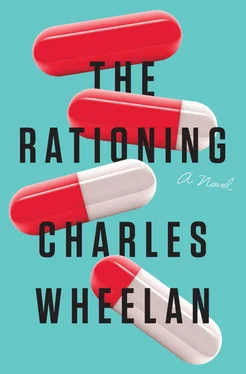The Communications Director flipped several pages ahead and began to read: “ ‘The United States will double the number of diplomatic license plates granted to the Chinese mission at the United Nations…’” He paused, incredulous. “They’re asking for more parking permits?”
In fact, yes. As Mason Freeman’s research has subsequently uncovered, the Chinese leadership in Beijing settled their disagreements over the contents of the document by including everything—not just parking issues at the UN, but also student visas, banking regulations, and even two paragraphs on the price American zoos would have to pay to breed Chinese pandas. Every diplomatic grievance the Chinese government had broached in the previous decade found its way into the “Friendship Agreement.”
“Is this serious?” the Chief of Staff asked.
The President replied, “They think they’re holding all the cards. They’ve gone all in.”
“But parking permits?” the Strategist said.
The Secretary of State offered the best analysis of the situation in that moment. She explained, “They perceive democracy to be a weakness. They can’t imagine that we’ll say no. They feel democracy forces leaders to make shortsighted decisions, that we have no choice but to do whatever it takes to get the Dormigen. When you have maximum leverage, why not ask for the moon? Worst case, we negotiate and they get most of what they want.”
“They don’t think we’ll let anyone die,” the President said.
“And?” the Strategist asked, inviting the President to verbalize what everyone in the room knew was going to be his decision.
“We can’t sign this,” the President said emphatically.
“I’ll draft a statement,” the Communications Director said.
“We should reflect on this,” the Chief of Staff said. “Let’s take a few minutes just to consider our options.”
“There’s nothing to think about,” the President said.
“Still,” the Chief of Staff implored. “Maybe we should go around the table?”
“I agree,” the Secretary of State said. “I’ll go first. Mr. President, I appreciate what we are asking you to do here. I don’t take that lightly. I think we need to reframe our thinking. As awful as it is that we may come up short on Dormigen—and that lives may be lost as a result—I would ask you to think about this situation differently. If China made this declaration unilaterally, if they took actions to expel us from East Asia, we would not let those actions stand. We would respond militarily, if necessary.”
“Probably not to the parking thing,” the Strategist said. The Secretary of State stared at him malevolently, furious at the interruption (and relatively unaccustomed to his attempts at irreverent humor). Others in the room suppressed smiles.
The Secretary of State continued, “If the military came to you and said, ‘We think we can repel this aggression successfully, but here are the projections for casualties,’ you would find the numbers we are looking at to be an acceptable cost for defending our vital interests.”
“I understand the logic,” the President said noncommittally. He looked to the National Security Adviser.
“I agree with the Secretary,” the National Security Adviser said. “If they asked only that we walk away from the South China Sea Agreement, or postpone it, then maybe it would be a harder decision, though if I’m being honest, even that would be a dangerous capitulation. But withdrawing all troops from East Asia? From a national security standpoint, I think there is only one defensible course of action here.”
“What’s the most appropriate historical comparison?” the President asked. “Because this is not Pearl Harbor. There is no obvious aggression here that I’m asking Americans to repel.”
“Probably Kennedy and West Berlin,” the National Security Adviser offered. “The East Germans started building the Wall. If Kennedy didn’t save West Berlin with the airlift, it would have been a major capitulation to the Soviets.”
“There wouldn’t have been major casualties, even if it went wrong,” the President said. “He wasn’t asking Americans to accept thousands and thousands of lost lives.”
“That’s right,” the National Security Adviser said. “The Cuban Missile Crisis might be more apt. Kennedy had to decide if the U.S. could tolerate Soviet missiles in Cuba. In facing down the Soviets, he was risking war. Maybe nuclear war.”
The President nodded in agreement. “What’s the best case for accepting the agreement?” he asked the room.
“For taking the Chinese Dormigen?” the Chief of Staff asked, trying to clarify what he was asking.
The Strategist, always keen to take any side of any issue, said, “A lot of Americans may die. You have access to the medicine that will save them. That’s your first responsibility, to protect the country.”
“Isn’t that what Cecelia Dodds is telling us?” the President asked. “It’s hard to watch people die when they could be saved. There’s something particularly terrible about that.”
“Yes,” the Chief of Staff agreed softly. “But she did tell you to stand firm with the Chinese.”
“While simultaneously reminding us of the price we’ll pay,” the President replied. “Maybe thousands and thousands of times over. All preventable.”
The National Security Adviser said, “Well, if I’m playing devil’s advocate, I would argue that America could tolerate a lower profile in East Asia. We could cede that sphere of influence to China without meaningfully impacting our quality of life. The are a lot of costs associated with being the world’s only democratic superpower.”
The President nodded to acknowledge the thought without betraying any obvious reaction. “Britain gave up its empire,” he said.
The Secretary of State interjected, “But not to the Soviet Union. Or to China. There’s a difference between acceding to independence movements and acceding to the demands of a nondemocratic power whose interests are very different from our own.”
“There are costs to leaving the world without a democratic superpower,” the President said.
“That’s right,” the Secretary of State agreed.
The Chief of Staff asked, “Who’s to say we can’t take the Dormigen and then ignore the agreement? Once we have the Dormigen, we don’t have to withdraw our troops from South Korea and Japan. Yes, they have the leverage now, but once we have the Dormigen that leverage goes away. Besides, an agreement made under duress, which this clearly is, is not legally binding.”
“You didn’t read page nineteen,” the Strategist said.
The Chief of Staff flipped through the document in front of her. After a moment she said, “Clearly I was not the only person who had that thought.” The Agreement stipulated that the U.S. would post a bond of some sort—nearly $500 billion in Treasury securities, along with the “deed” to assorted U.S. possessions in the Pacific, including Guam.
The Strategist said, “If we go back on our word, they get Guam. It’s not exactly Pearl Harbor, but close.”
The President, ignoring the comment, said, “Technically this is not duress. The Chinese government is offering us something that we are free to refuse. We can always walk away from the agreement.”
“This is just their opening offer,” the National Security Adviser offered.
“We don’t have a lot of time,” the President replied. “In any event, it doesn’t change our response if we think this is a bad deal. The more forcefully we repudiate what’s on the table, the more leverage we have to negotiate something better.”
“Is there any part of this, other than the UN parking, that we would be likely to agree to?” the Secretary of State asked the room.
Читать дальше












